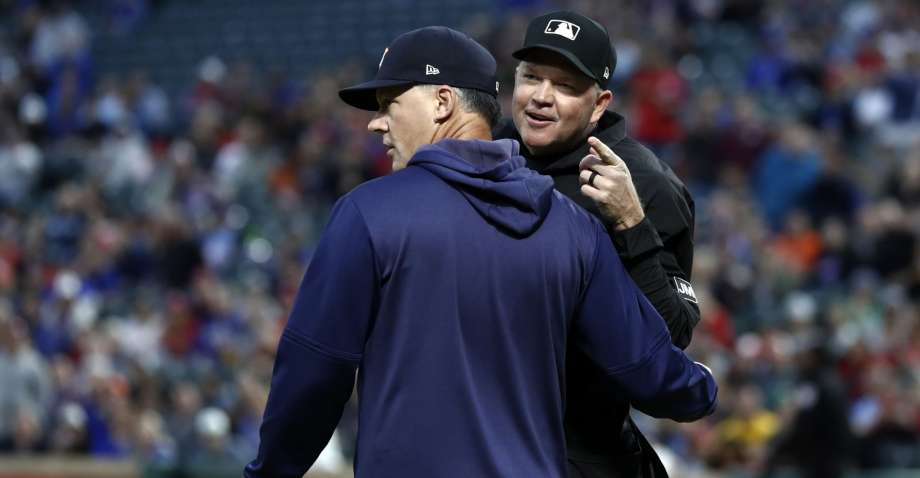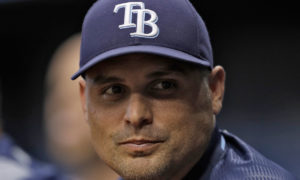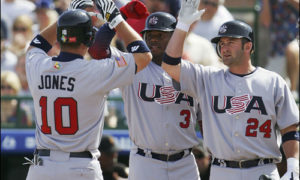Ron Kulpa Embarrassed Himself and Baseball

“I can do anything I want. I can do anything I want. That’s right.”
This is the kind of talk you might expect from Donald Trump on the campaign trail, not an MLB umpire. And yet, these were the words of MLB umpire Ron Kulpa to Houston Astros manager AJ Hinch following the latter’s ejection from a recent contest.
How did Kulpa and Hinch get to where they got? Bill Baer, of NBC Sports, gives us a blow-by-blow of the affair. It all started when Gerrit Cole was on the mound for the ‘Stros. Cole had Texas Rangers slugger Joey Gallo dead to rights on a third strike. Only Kulpa called it a ball. Viewing the pitch location as furnished by Statcast and appended by Baer, it’s not even close to a ball. The baseball is completely within the bounds of the strike zone. Cole had begun to walk off the field it was so obvious—at least to most objective observers.
Not content with missing that call, Kulpa compounded his errors the next inning by calling the Rangers’ Mike Minor pitch to Tyler White a strike. This one was more defensible, but still wrong. No part of the baseball finished within the strike zone. At this point, members of the Astros bench, led by hitting coach Alex Cintron, started, ahem, letting Kulpa know what they thought of his performance.
This apparently set Ron Kulpa off. He responded by yelling back into the Astros dugout, prompting Hinch to come out and talk with Kulpa to try to diffuse the situation. It worked, albeit temporarily. Kulpa continued to stare into the Astros dugout, even as Minor was getting ready to throw his next pitch. Hinch could be seen saying “Don’t look over here.” Undeterred, Kulpa pointed to Cintron, signaling his ejection. Hinch came out a second time to try to assuage Kulpa’s anger.
And yet, he persisted. Kulpa continued to stare into the Astros dugout. Hinch was picked up by on-field microphones, saying “You can’t keep doing it.” Kulpa disagreed, this time ejecting Hinch, bringing him out for a third and final time, and yielding the comments referenced at the start of this piece. Unsatisfied, Kulpa also yelled at Cole despite the pitcher not even looking in his direction and had words with Astros catcher Max Stassi.
The responses on social media, from sports commentators, and by sports reporters following this fracas were decidedly negative toward Kulpa—and deservedly so. Umpires make bad calls. It happens. Still, Kulpa shouldn’t have made matters worse by getting into it with Hinch et al., and he certainly shouldn’t have been looking at the dugout when Minor had his toe on the rubber ready to deal. Kulpa’s defiant attitude had people calling for his suspension, if not his job. And it wasn’t just Astros fans either.
At this writing, it’s unclear whether Ron Kulpa will be disciplined for his actions. According to A.J. Hinch, he spoke with Joe Torre, MLB chief baseball officer, the day after as a matter of standard operating procedure, and indicated the matter was “case closed.” To his credit, Hinch has spoken diplomatically about the situation after the fact, merely referring to the events as “unfortunate.”
History suggests Kulpa won’t be punished, however. Not only is this not the first time he has displayed his umbrage at being challenged by a player but umpires rarely feel the brunt of helping to escalate on-field tensions. Bill Baer closes his account of Kulpa’s ejection-fest with these thoughts:
Kulpa, 50, has been an umpire in the majors since 1998. He is not new to creating drama on the field. Should Cintron and others in the Astros’ dugout have been hectoring Kulpa as much as they were? Of course not. But Kulpa should be focused on reducing and resolving conflict, not throwing gas on the fire. As we have seen, umpires are rarely held accountable for their conduct on the field, which is why they have no problem exacerbating issues with players and coaches.
As former NFL coach Herm Edwards once famously put it, “You play to win the game.” That impassioned response during a post-game presser echoes the emotions of the athletes on the field striving to achieve that very goal. Baseball is their livelihood. They’re going to be upset when they perceive they are not getting a fair shake. A man of Ron Kulpa’s age and experience should be better equipped to handle encounters like these by remaining neutral and not adding proverbial fuel to the fire. Kulpa did the opposite in this instance.
Numerous tweets during and after the Astros-Rangers game quipped about dust-ups like this paving the way for robot umpires or an otherwise automated strike zone. That’s what makes this all so frustrating: aside from a lack of accountability for umpires regarding their conduct, there doesn’t seem to be much accountability for umpires re balls and strikes either. Baseball is unique among the major sports in that the strike zone can change depending on who’s calling the shots. Imagine if the nets in basketball and hockey or the goal posts in football changed depending on an official’s viewpoint. If instant replay weren’t already a function in these sports, they would have to institute it under such circumstances.
To stress the earlier point, humans make mistakes. Knowing full well I would look silly trying to hit a 95+ MPH fastball with movement, I can’t imagine it’s easy to call balls and strikes. This notwithstanding, the absence of a meaningful review process for strike zone accuracy, whether during or after the fact, undermines fans’ confidence in the game. A team of Boston University researchers led by Mark T. Williams recently published a study analyzing over 10 years of balls and strikes and the umpires that called them.
The contents are too exhaustive to list here, though it’s a recommended read. The study’s summary provides five standout findings:
- a two-strike bias favoring pitchers exists,
- blind spots at the top corners of the strike zone were persistent across the time period,
- younger umpires tend to outperform veterans, perhaps motivated by desire to prove their worth,
- the difference in umpire error rate by inning was marginal,
- error rate has decreased steadily since 2008.
On the last point, this is, of course, good news. Williams, however, insists results could be that much better and the study does not account for how the strike zone may have shifted (intentionally) in recent years. Furthermore, he chides Major League Baseball for its inaction on improving accuracy. He writes:
As this research has demonstrated, poor umpiring persists. Despite years of data-driven evidence, MLB has been slow to expand the ranks of younger umpires, missing the opportunity to rapidly lower unacceptably high bad call rates. The league has also dragged its feet in putting strike zone–assisted technology behind the plate. In a thinly veiled attempt to silence vocal critics, MLB recently announced it will begin to test robot umpires, but only on a small scale, through the unaffiliated Atlantic League farm program. Instead of addressing this pervasive big-league problem now, MLB continues to stall.
The standard rebuttal to a possible influx of technological improvements to baseball is that robot umpires and strike zone assistance will mean the death of umpires. Williams addresses this head-on, though, insisting that these are helpful tools which will allow officials to focus on other aspects of the game such as pace of play. Regardless, the aim of league officials should be to improve the fan experience and not to resist change. Instead, their MO heretofore has been to protect their worst-performing umpires, with little evidence that they are encouraged or helped to improve.
The job of an MLB umpire is not an easy one, nor is it altogether glamorous. Presumably, though, that’s not why these men are getting into the business of umpiring. For that reason, that we’re even mentioning Ron Kulpa or know others by name—Angel Hernandez, Joe West, and Laz Diaz jump to mind—seems like a bad bit of happenstance for the league. Despite the challenges of the position and the notion that tempers can flare in any profession, umpires should be held to a certain standard of behavior and performance. Ron Kulpa failed on both counts and Major League Baseball would do well not to turn away from this embarrassing fact.
-Joe Mangano


















